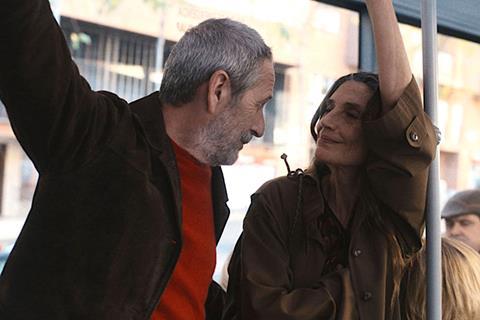They Will Be Dust Dir: Carlos Marques-Marcet. Spain/Italy/Switzerland. 2024. 106mins The flatly declarative title of They Will Be Dust suggests that t
They Will Be Dust
Dir: Carlos Marques-Marcet. Spain/Italy/Switzerland. 2024. 106mins
The flatly declarative title of They Will Be Dust suggests that the idea of death is something we are just going to have to get used to. This matter-of-fact approach seeps into the style of Carlos Marques-Marcet’s daring fourth feature, an admirably unsentimental and involving end-of-life drama that comes, unusually, peppered with dance sequences.
Uniquely Combining Sentiment and Dance
The film could have perfectly well been played as straight drama, carried by performances from veterans Angela Molina and Alfredo Castro. The daringly experimental choice to break the emotional flow with dance, however, has helped the film to win Toronto’s Platform award, but may divide viewers when Dust opens Valladolid festival in October before releasing theatrically in Spain in November.
A Potent Rawness
The opening sequence, featuring actor Claudia (Spanish grande dame Molina) going wild with pain and being calmed down by her theatre director husband Flavio (Chilean actor Castro) and daughter Violeta (Monica Almirall Batet, in her debut feature), has a potent rawness that is not replicated throughout the rest of the film. With Maria Callas singing an aria from Samson And Delilah in the background, the scene morphs into ballet – a memorable highlight.
The Emotional Consequences of a Difficult Choice
Claudia has a brain tumour and has decided to end her life in Switzerland, while Flavio, unable to face life without her, has decided to die by her side. The emotional consequences of this are not played out as fully as they might be, but the film’s first section does a great job of persuading us that Claudia and Flavio, both from the theatrical world, have a long history and an undying devotion to one another. It is totally plausible that Claudia’s illness should, as Flavio explains it, have killed his own ambitions.
A Haunting and Unsettling Portrayal of Mortality
The breakup of the couple’s other children and their families, as they come to terms with the couple’s decision, adds a layer of discomfort and unease to an already difficult-to-watch portrait of mortality. The truth about the double suicide comes out cruelly in front of small children, in a speech by Violeta (“May they die happily ever after!”) and we begin to suspect, as does Flavio, that Claudia has set the whole thing up as a dramatic final performance.
Conclusion
Marques-Marcet’s previous work takes problematic situations and follows the emotional logic as far as it can go. They are largely artifice-free, but the busily choreographed free dance sequences, accompanied by Maria Arnal’s minimalist acapella score, do feel somewhat wedged in and are likely to split opinions. While they are striking as standalones, and the idea that dancing is the best antidote to death comes over loud and clear, they break the hard-earned emotional flow. It’s also hard to see where they are emerging from dramatically, unless it’s from somewhere deep in Claudia’s psyche.
FAQs
- How did the film win Toronto’s Platform award?
The film’s experimental approach and emotional flow were praised, although it may be a divisive choice for some viewers. - Will the film be released theatrically in Spain in November?
Yes, the film will be released theatrically in Spain in November. - Who are the main cast members?
Alfredo Castro, Angela Molina, Monica Almirall Batet, Patricia Bargallo, and Alvan Prado. - Who is the director of the film?
Carlos Marques-Marcet. - What is the genre of the film?
End-of-life drama.

COMMENTS